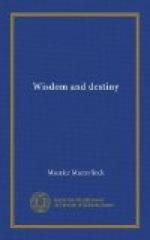23. These feverish hours of history resemble a storm that we see on the ocean; we come from far inland; we rush to the beach, in keen expectation; we eye the enormous waves with curious eagerness, with almost childish intensity. And there comes one along that is three times as high and as fierce as the rest. It rushes towards us like some monster with diaphanous muscles. It uncoils itself in mad haste from the distant horizon, as though it were bearer of some urgent, complete revelation. It ploughs in its wake a track so deep that we feel that the sea must at last be yielding up one of her secrets; but all things happen the same as on a breathless and cloudless day, when languid wavelets roll to and fro in the limpid, fathomless water; from the ocean arises no living thing, not a blade of grass, not a stone.
If aught could discourage the sage—though he is not truly wise whose astonishment is not enlightened, and his interest quickened, by the unforeseen thing that discourages—it would be the discovery, in this French Revolution, of more than one destiny that is infinitely sadder, more overwhelming, more inexplicable, than that of Louis XVI. I refer to the Girondins: above all, to the admirable Vergniaud. To-day even, though we know all that the future kept hidden from him, and are able to divine what it was that was sought by the instinctive desire of that exceptional century—to-day even it were surely not possible to act more nobly, more wisely, than he. Let fortune hurl any man into the burning centre of a movement that had swept every barrier down, it were surely not possible to reveal a finer character or loftier spirit. Could we fashion, deep down in our heart, out of all that is purest within us, out of all our wisdom and all our love, some beautiful, spotless creature with never a thought of self, without weakness or error—such a being would desire a place by the side of Vergniaud, on those deserted Convention seats, “whereon the shadow of death seemed already to hover,” that he might think as Vergniaud thought, and so speak, and act. He saw the infallible, eternal, that lay the other side of that tragical moment; he knew how to be humane and benevolent still, through all




